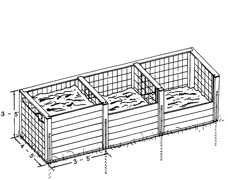SpliceOfLife1.7-Compost

I used plans from James Underwood Crockett’s Victory Garden book, what he called his Cadillac Composter. Three spaces of about a cubic yard each. The left-most for fresh material, the middle for half-done, and the right for the finished stuff; a simple, heavy wooden frame encased in chicken wire and landscaping cloth with boards stacked in milled grooves along the front. I bought a box of composting worms and started collecting every bit of organic waste I could get my mits on, but not grass clippings. Those sour the mix and are better left on the lawn, anyway.
Thirteen years later, I’m back preparing the composter’s space behind the garage for a tree removal, and I thought it proper that the composter, unused by the tenants over the last five years, be moved out of the way. This dictated that I first remove the remaining compost. I raked the dry leaves off each mound and started shoveling. The bins were less than a quarter full of the richest material known. I dug it out and spread it around the gardens I’d earlier in the week weeded out. This left a rich, black layer, as if I’d poured black gravy over the soil.
Those amount to the facts of this matter, but the facts matter little. I found myself remembering many fine times. Those summer afternoons ferrying pot-fulls of orange, fresh-blanched tomato skins while The Muse canned tomatoes inside. The brisk autumn days when I’d donate the finest leaves into the mix. The spring mornings when I’d turn the winter-seasoned stuff, making room for the coming prunings and pickings. Ours—that composter and I—was a true relationship.
Little of the sustainability talk acknowledges the required patience and perseverance. Like true love, arm’s length won’t cut it. Lip deep might. One must intervene in that moment one might discard down the disposal and choose differently, delaying closure on that clean-up job before schlepping across the yard to contribute to the future. Composting might be the perfect accompaniment to slow food, to slowing down a life.
Life moves quickly enough without the addition of time-saving innovations. The real stuff takes about as long to produce as it ever did; their value eternally immeasurable. We take our time and make nothing but soil from it.
©2014 by David A. Schmaltz - all rights reserved


